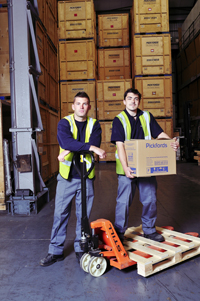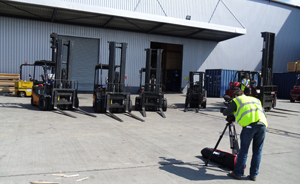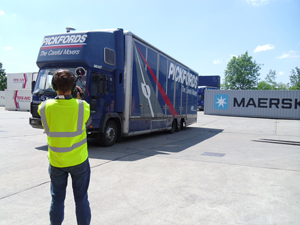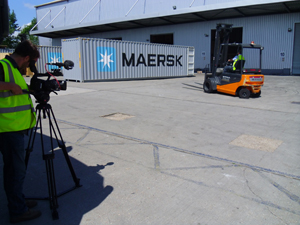The making of a TV show. Pickfords' staff became TV stars inthe six-episode documentary The Removal Men: Pickfords.
It was at the back end of last year that Pickfords received a call that would provide one of its biggest marketing opportunities ever. Between then and this summer, the company’s staff embarked on an adventure they will be retelling to their grandchildren. In an interview with Lyndsey Daykin, Pickfords’ Head of Marketing, Steve Jordan found out what happened when Pickfords’ staff became TV stars and just what was involved in producing the six-episode documentary The Removal Men: Pickfords watched by 1.2 million viewers every week.

The call was from Tiger Aspect Productions, an independent TV production company. Recently Tiger Aspect has been responsible for an eclectic mix of programmes such as: The Secret Diary of a Call Girl; Ross Kemp: Extreme World; Cook Yourself Thin; and When Piers met Andrew Lloyd Webber. The company was investigating a documentary series involving working men and women and the ways in which they interacted with the public. The moving industry seemed to fit the bill.
“We recognised that it was a fantastic opportunity but also that, as an observational documentary, things could go wrong on camera,” said Lyndsey. “We knew that we would have little control over what was filmed or any editorial rights. We had faith in our teams and managers to show the company and the industry in a positive way.”
Having decided it was a good idea, Pickfords then had to convince itself that it could pull it off. “We didn’t know if we could find enough customers or employees who would be willing to take part, or be able to manage to make it interesting,” said Lyndsey. “Moving into and out of three bedroom bungalows with wide doors doesn’t necessarily make good TV.”
But the first hurdle was to convince Tiger Aspect that removals in general and Pickfords in particular were suitable subjects for the programme. “We had to persuade them that we could do it,” said Lyndsey. “They were just exploring the idea at that stage. We regaled them with stories about the moving industry and some of the characters in the company and they eventually agreed to do a ‘taster film’.” The taster is a 15-minute short to illustrate how the programme will look. Tiger Aspect used this to pitch the idea to Channel 5.
Pickfords, of course, wanted to show its ability to make moves go smoothly for its customers but, embraced the possibility that things might not go according to plan on camera It would be the ways in which the men handled the problems that would demonstrate their professionalism. 
Pickfords persuaded three London customers to take part in the taster. This provided an element of control because the jobs were local and the crews could be fully briefed before they took part. The taster film was also used to brief the branch managers around the country so they would know what to expect. “I was fine with the taster film but when it went national it all became a bit stressful as the whole process was more difficult to control,” Lyndsey said.
Tiger Aspect gave Pickfords the OK in March. It was a tight schedule: there was only six weeks production time from start to finish. This concentrated the minds of Mark Tyler, John Denton, Jordan Smart and Lyndsey herself at head office, plus all the managers, who had to get everything ready. The key task was to find three willing customers to be in each of the six shows. These proved hard to find. Customers were remarkably reluctant to take part. By the time filming started the team only had enough customers for the first two programmes. Jordan Smart and John Denton had to be brought in off the road to telephone every enquiry that was made during the six week window.
This reluctance to take part gave Pickfords an unexpected problem. Lyndsey said that she had expected to be able to hand-pick three or four crews, brief them fully and follow them around. But that’s not the way it worked out. “We were dictated to by the customers and the branches they were using. It was up to the branch managers to brief the crews and then leave them to it,” said Lyndsey. Any control over the process had gone for Pickfords as filming took place all over the country, at the same time. It was totally in the hands of the production team and its own staff at branch level. “But the crews were a revelation to me. They were so good with the customers, and the more mature guys in particular were very good on camera.”
Although no money changed hands either way, it was still a tremendous investment for Pickfords. Lyndsey said she did almost nothing else but co-ordinate filming for six weeks. Some of the effort was wasted too. For example many of the top management team were interviewed on specialist subjects - Mark Herrington was filmed talking about business moving; Ashley Jones was filmed speaking about Pickfords’ history; Russell Start, the MD, was filmed during a quality control visit – but none of it was used. In the end it was decided to keep the programme focussed on the crews and the customers.
Pickfords also had to dedicate time to answering some rather odd questions such as: How many cups of tea does a removal man drink in a year? and, How many rolls of tape does Pickfords use in a year? “It all takes work to research,” said Lyndsey. The team was asked to do some pretty unusual things. For example, Dell Wilmot in the international warehouse at Wembley was asked to get his staff to perform a fork-truck ballet for the cameras! He did, but the footage wasn’t used. There was also a tremendous time investment in gaining permissions and compliances. It was a mammoth task.
 Anyone who has ever been involved with filming will be familiar with the stop-start process and endless retakes. But that was not how Tiger Aspect operated. Pickfords had been most insistent that customers should not be disadvantaged at any time; none were. The film crew on-site consisted of a single camera man or woman and a runner. The footage was taken as it happened with few hold ups in the moving process.
Anyone who has ever been involved with filming will be familiar with the stop-start process and endless retakes. But that was not how Tiger Aspect operated. Pickfords had been most insistent that customers should not be disadvantaged at any time; none were. The film crew on-site consisted of a single camera man or woman and a runner. The footage was taken as it happened with few hold ups in the moving process.
“We had to do some extra filming for continuity shots, sometimes these requests were short notice and we had to say that we couldn’t get that crew together because they were booked out on a move. Somehow we moved crews around and hit the deadlines, our branch and area managers were great, managing these short notice requests,” said Lyndsey. She also told of some operational difficulties that had to be overcome such as the day they did the helicopter shots. The helicopter shots are woven through the entire series and show a variety of Pickfords vehicles from the air. This involved getting together a range of Pickfords’ finest vehicles for an aerial photo shoot on the Tuesday after Easter. The decision was taken on Thursday, the night before Good Friday. All the preparation had to be done over the bank holiday including getting the right truck with the right driver to Wembley where they were briefed. If the weather had been bad, the shoot would not have gone ahead. “Fortunately it was a sunny day otherwise we would have had to do it all again.”
There was no negative reaction from the customers and the camera men and women were very complementary about the crews’ performance both on camera and off. Within the industry, of course, the reaction has been more mixed. Most have recognised the programme as a boost for both Pickfords and the industry as a whole. Some have taken a more cynical view.
So what’s the payback for Pickfords? After all this effort what do they get out of it?
Lyndsey said they have had record number of Unique visitors to the website since the series aired and many customers have said they contacted the company as a result of the show. But perhaps there’s more, and maybe even something for the whole industry.
On 15 December 1998, Grant Whittaker went ‘Back to the Floor’ for the BBC2 series. “We still have people commenting on that programme,” said Lyndsey, “and that was just one day. I hope that the series creates credibility and trust in the business and will stick in people’s minds long after the series has finished.”
It is also Lyndsey’s hope that the series has demonstrated the professionalism of the modern moving business. “I hope that, if we do anything, we will persuade people to call a professional mover rather than do it themselves. That’s what I’m hoping will be the lasting benefit, not just for Pickfords but for the whole industry.”
Despite the work involved, Lyndsey and her team are very happy with the result. “I am totally proud of the programme,” she said. “Having started with some reservations I am delighted with the way it turned out. I think it’s funny and is good for the industry. The impact on our employees has been great because they have all got a boost from being on TV. We talk about the programme, we critique it, we laugh at it; it’s so good to be associated with a company that’s got its own TV programme.”
But whether it has a wider effect might depend largely on other companies in the industry. There is no doubt that the programme has brought the industry into everyone’s living rooms. Most people feel that the image it has created is a positive one that unveils some of the difficulties and the need for employing professionals. Other companies in the industry could be cynical and pick fault, but if they do are they not missing a trick? Would they not be better to praise it, wish to be associated with it, and use it as a way of helping their own sales staff alert their customers to the skills required to perform their move effectively? If they do, perhaps this could just be the boost the industry needs as it emerges from one of the most difficult economic periods in its history.
Will there be a second series? We’ll have to wait and see!


Industry comments
I think the programme gives a decent overview of the industry however it makes out that the crews have to deal with everything without the support and back up from the operations and or management teams. It also gives an unrealistic guideline on cost for some moves. As a plus point the difficulties caused by clients are very apparent, hopefully some of them will learn from it. Angus Russell, Britannia Lanes.
It’s great to see the removals industry represented on the TV, particularly in a prime Channel 5 slot. I enjoyed seeing Pickfords represent themselves and the industry really well. We know when one of our clients featured on TV 18 months ago there was a very positive response for them in terms of enquiries and exposure. I am sure the wider industry will benefit from seeing how things work and hopefully people should understand why they should only use a professional remover - because everyone knows moving is very stressful. Rob Thacker, Pound Gates Insurance
I think whoever is in charge of marketing at Pickfords should be given a big bonus if he or she had anything to do with initiating the programme. No publicity being bad publicity (and I guess there was an editing clause in the contract) means Pickfords have a £20 million pound TV campaign for free. What I've seen seems fairly positive for Pickfords and the industry. Pickfords is a name like Coca-Cola and Hoover that is wired into the British psyche so I doubt it would work with any other moving company. Andy Wade, F&N Removals
Quite honestly, I do not think that the programme showed our industry at its best. The commentary was regularly inaccurate over the number of trucks, volumes, men, charges, etc. There was far too much ‘joking about’ and not enough of the professionalism that should be our benchmark. I fail to see how the programme can benefit Pickfords. Stephen Morris, Stephen Morris Shipping Plc
From a removal operator’s point of view I could be quite critical, however I think in this case that would be unfair. The programme seems to promote Pickfords in a good light, with the emphasis on the operational staff and the customers. The viewers probably see this as generally light entertainment showing the removals industry as soft and cuddly. It won't do Pickfords any harm at all, but I am sure that would have been the agreement from the outset. Well done Pickfords, a great PR opportunity for the company and the industry as a whole. This will not do any of us any harm. Brian Maidman, Maidmans